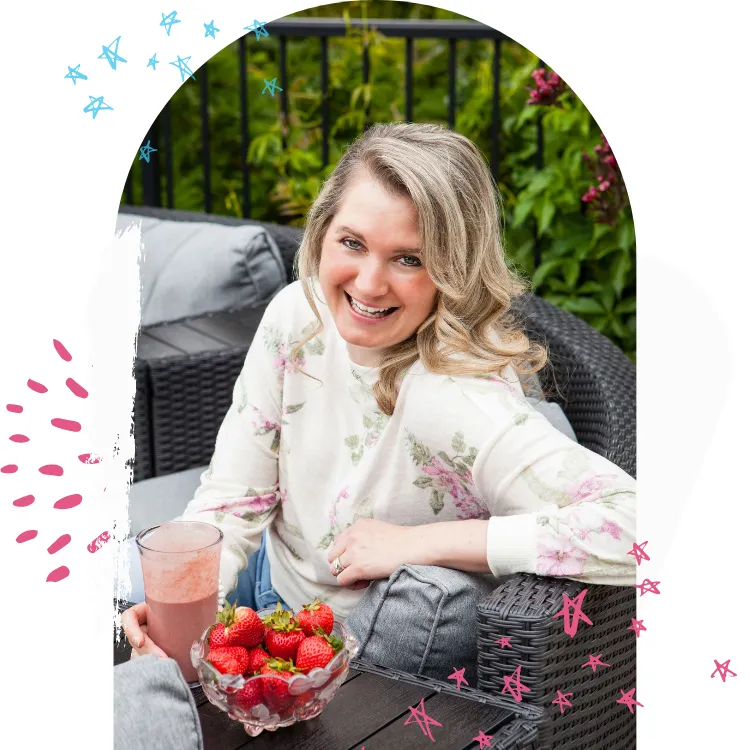Is Perimenopause Running the Show (and Not Letting You Read the Script)?
Let’s change that—starting today.
Perimenopause can feel like a full-time job no one trained you for. The mood swings. The fatigue. The 3AM anxiety spirals. Sound familiar?
You don’t have to do this alone—and you shouldn’t
have to piece it together from late-night Google searches. That’s why I created these free guides to help you cut through the chaos and start feeling like you again.
Grab one now and get real-life tools to support your hormones, energy, mood, and more.

What Even is Perimenopause?
Think of it like the winding (and sometimes bumpy) road leading up to menopause. It usually kicks off in your 40s—but for some women, it can start even earlier.
Hormone shifts during this time can cause symptoms like:
✅Hot flashes that hit out of nowhere
✅Mood swings that rival your teen years
✅Night sweats, brain fog, and libido plot twists
✅Irregular periods that love to keep you guessing
Sound familiar?
It can feel like your body’s rewriting the script without telling you—but here’s the thing:
You’re not broken. You’re transitioning. And it’s completely normal.
The key is having the right tools, support, and knowledge to navigate it with more clarity (and a lot less confusion).
Hi, I'm Kim
Holistic Nutritionist. Certified Menopause Coaching Specialist. Midlife truth-teller.
I’ve been where you are—confused, exhausted, and wondering if I was the only one Googling “why do I feel like a hormonal alien?” at 3AM.
Now, I help women in midlife ditch the guesswork and get real support for their hormones, health, and emotional well-being. My approach blends science-backed tools, mindset shifts, and plenty of permission to not have it all together!
This isn’t just about surviving perimenopause.
It’s about reclaiming your energy, your mood, your body—and your joy.

My Approach: Real Support, Real Women, Real Results
Let’s be real—midlife health advice often feels like it was written for 25-year-olds with zero hormone chaos and unlimited time. That’s not you. And it’s definitely not me.
Here’s what I believe:
✅You don’t need to “push through” or “just deal with it.”
✅Your symptoms aren’t in your head—they’re in your hormones.
✅Real change happens when we stop judging ourselves and start supporting ourselves (with food, movement, rest, and compassion).
As a Holistic Nutritionist and Menopause Coaching Specialist, I focus on science-backed strategies
blended with grace, humor, and zero shame. Whether you’re dealing with mood swings, fatigue, or a libido that ghosted you—there’s a way forward.
My work isn’t about perfection—it’s about giving your body what it needs and your mind the space to catch up.
From the Blog: Real Talk for Real Hormones
No fluff. No fear-mongering. Just science-backed advice, cheeky encouragement, and the kind of midlife support you actually want to read. Whether you're riding the emotional rollercoaster or wondering if brain fog is your new personality—I've got you.

Midlife, Moisture & the Missing Mojo: Sex & Relationships After 40
Midlife, Moisture & the Missing Mojo: Sex & Relationships After 40
“For me, midlife isn’t the end of desire—it’s the moment I finally know what I want.”
Let’s be real: talking about sex in perimenopause can feel like trying to talk about vibrators at a family dinner. Awkward, a little sweaty, and full of sideways glances. But here’s the truth bomb: if your libido feels like it packed a bag and ghosted you, or if the idea of sex feels more “meh” than magical—you’re not broken.
In fact, you’re navigating one of the biggest hormonal plot twists of your life. And guess what? That deserves more than silence and shame. It deserves honesty, curiosity, and a whole lot of grace.
These changes in sex drive, arousal, and connection aren’t just random—they’re part of the shifting landscape of menopause symptoms and sexual health during midlife.
So, let’s talk about sex, baby. (Even if it’s complicated.)
What’s Going on Down There: The Hormonal Shift
Think of your hormones like a backstage crew suddenly quitting mid-show. Estrogen, progesterone, and testosterone are fluctuating, and their exits and entrances can affect everything from libido and lubrication to how you feel in your own skin.
You might notice:
A “meh” sex drive
Vaginal dryness (like, who turned off the sprinkler system?)
Mood swings and anxiety that crash the party
Changes in emotional closeness or communication with your partner
None of these mean you're doing it wrong. They just mean you’re in transition. And transitions—especially hormonal ones—can be messy, revealing, and yes, transformative.
The Hormonal Shift: Why Sex Might Feel Different in Perimenopause
During perimenopause, levels of estrogen, progesterone, and testosterone can fluctuate wildly. This affects more than just your period—it impacts libido, arousal, comfort during sex, and even how you feel in your skin.
You might notice:
A lower sex drive
Vaginal dryness or discomfort
Mood swings, anxiety, or self-image dips
Emotional distance or shifting relationship dynamics
None of this means something is “wrong.” Your body is evolving—and your sex life can evolve with it.
Want to understand how testosterone impacts your energy, mood, and libido during perimenopause? Check out this guide on testosterone and midlife women to learn how this often-overlooked hormone plays a powerful role in intimacy and vitality.
Real Talk: When Your Sex Drive Goes on a Soul-Searching Retreat
Let me be totally honest: sometimes, I wish sex wasn’t even a thing. Not because I don’t love my partner—but because, well, it can feel like a “have to” instead of a “want to.” Some days, the idea of being naked feels about as appealing as showing up to a PTA meeting in your underwear. Nope, nope, nope.
Add to that the fact that I grew up in a house where vagina was a forbidden word and sex was shrouded in silence. I learned early that pleasure came with a side of guilt—and it’s taken years (and therapy... and wine… and then no wine) to start shaking that off.
And now in perimenopause, when everything’s shifting, my relationship with sex is shifting too. Some days I’m all about cuddles and closeness. Other days, I want cozy socks and no one touching me ever. Sound familiar?
Here’s what I’m learning: I’m not broken. I’m just evolving.
And from this place of softness and honesty, intimacy can take on a whole new shape—one that’s less about pressure and performance, and more about feeling seen, safe, and connected.
“A big thing about sex is you have to feel safe and you have to not be stressed.” – Dr. Kelly Casperson
✨ Reflect:
What early messages did you get about sex and your body?
Are they helping—or just hanging around like outdated software?
Communication: The Unsung Hero of Midlife Intimacy
Forget oysters and lingerie. The most underrated aphrodisiac? Honest, open communication.
Here’s how to start the convo (without making it weird):
Name what’s going on. Let your partner in on the hormone circus. Mood swings, dry spells, and all.
Ask for what you need. Maybe it’s more foreplay. Maybe it’s a break. Either way, your needs matter.
Get curious about them. Your partner’s likely navigating aging, stress, or insecurities too.
Bring in backup. A couples or sex therapist can help untangle the tension and bring in new tools.
Remember: intimacy isn’t just about intercourse. It’s about laughing at inside jokes, hand-holding during hard days, and knowing someone gets you—even when you’re not feeling sexy.
Confidence, Self-Love & Midlife Pleasure (Yes, That’s a Thing)
Before we connect with someone else, we’ve got to reconnect with ourselves. That starts with reclaiming pleasure—on your own terms.
Appreciate your body for what it does, not just what it looks like. This vessel is still full of magic.
Lean into sensual self-care. Think slow movement, warm baths, soft fabrics, nourishing touch.
Explore your own pleasure. Yes, that means vibrators, lubricants, and quiet time alone. Own it.
Ditch the “past your prime” lie. Your prime is whenever you say it is.
Because midlife pleasure isn’t selfish. It’s healing.
Redefining Intimacy: You Make the Rules Now
Let’s throw out the dusty rulebook and create a new one.
Try:
New positions that work with your body—not against it.
Lube and toys that make things more fun and less stressful.
Slow, sensual connection—think massage, long kisses, or touching just for pleasure, not performance.
Inject novelty. New experiences together spark dopamine (and desire). Dance class, romantic getaway, or even just laughing together over a new recipe.
There’s no gold star for having sex a certain way. The only goal? Connection that feels good to you.
When to Call In the Experts (AKA: You Deserve Support)
If sex feels painful, disconnected, or just “off,” don’t suffer in silence.
Talk to your doc. Vaginal estrogen, hormone therapy, pelvic floor support—there are options.
Work with a therapist. Sometimes a little guidance can reignite what feels lost.
Find your people. Talking to other women going through the same thing? Game-changing.
Final Thoughts: This Isn’t the End—It’s a New Beginning
Perimenopause doesn’t mean your sex life is over. It means your relationship with intimacy is shifting—and you get to decide what that looks like now.
Be curious. Be kind. Be open to rediscovering what lights you up.
Because you’re not less—you’re more you than you’ve ever been.
Hormonally Yours,
Kimberlee Erin
Just a heads-up: I’m a Certified Menopause Coaching Specialist and Holistic Nutritionist, and while I love sharing what’s worked for me and my clients, this blog is for informational purposes only. It’s not a substitute for medical advice. Always check in with your healthcare provider before starting new supplements, hormones, or treatments—especially since every woman’s perimenopause journey is different. You deserve personalized care that truly fits you.
Meeting Kim was a turning point in my perimenopause journey. I was overwhelmed by the constant fatigue and emotional ups and downs. Kim’s holistic approach helped me understand what my body was going through. Her personalized nutrition plans and stress management techniques have been a lifesaver. I now feel more balanced and in control of my health. Kim's support has been nothing short of amazing.
- LIZ
FREE DOWNLOAD
